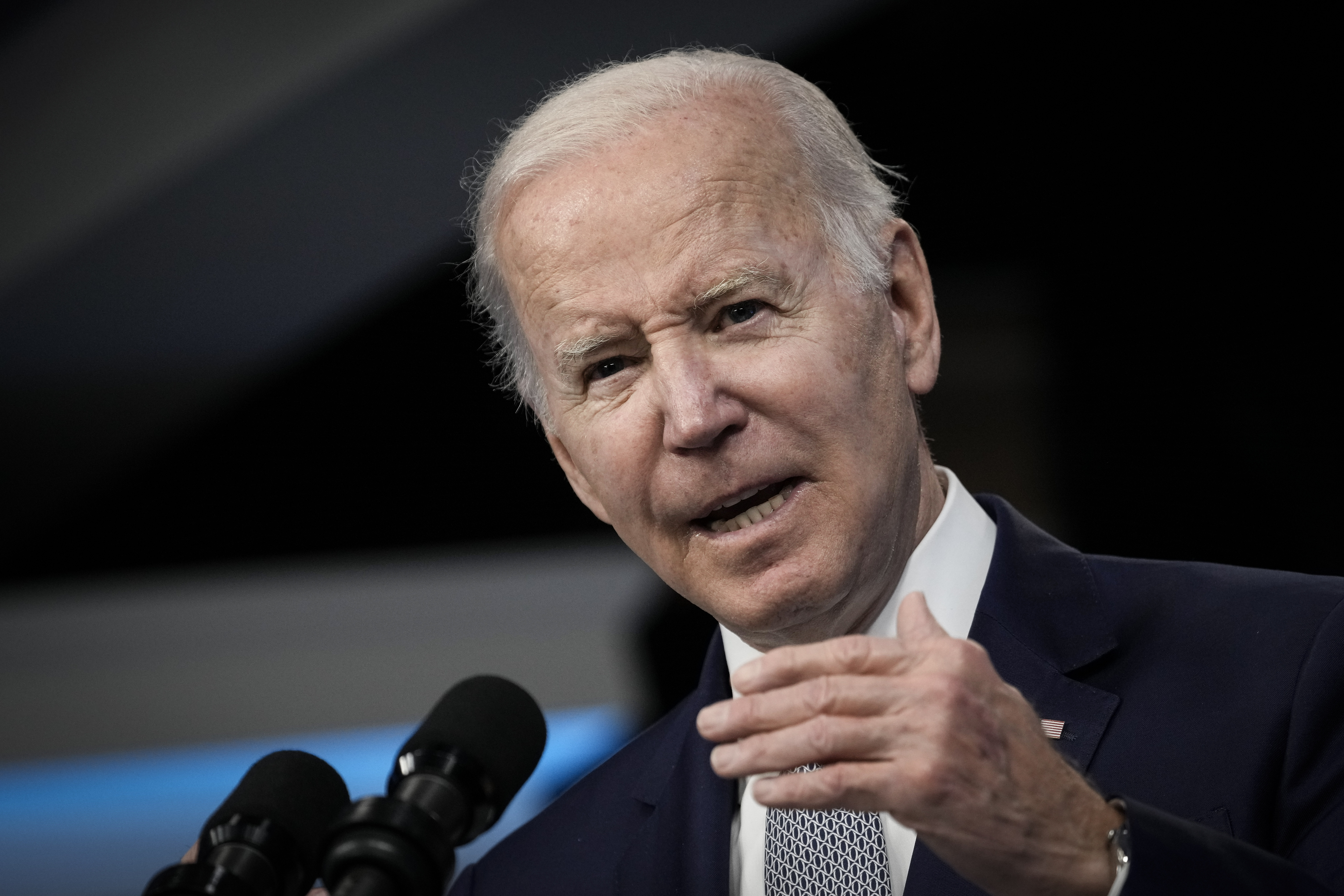|
Presented by ExxonMobil: Delivered daily by 8 a.m., Morning Money examines the latest news in finance politics and policy. | | | | |  | | By Kate Davidson and Aubree Eliza Weaver | | | Editor’s note: Morning Money is a free version of POLITICO Pro Financial Services morning newsletter, which is delivered to our s each morning at 5:15 a.m. The POLITICO Pro platform combines the news you need with tools you can use to take action on the day’s biggest stories. Act on the news with POLITICO Pro. STICKING TO THE SCRIPT — The Biden administration has an inflation message and they’re sticking to it: Sorry, but it’s not our fault. President Joe Biden on Tuesday, in remarks at the White House ahead of today’s latest Consumer Price Index report, reiterated that inflation is a global phenomenon, driven primarily by the pandemic, which shut down the global economy and threw supply chains out of whack, and by the war in Ukraine, which sent commodity prices soaring in March and April. Conspicuously absent: Robust demand, which many economists say was fueled at least in part by federal stimulus spending last year.
| | | | STEP INSIDE THE WEST WING: What's really happening in West Wing offices? Find out who's up, who's down, and who really has the president’s ear in our West Wing Playbook newsletter, the insider's guide to the Biden White House and Cabinet. For buzzy nuggets and details that you won't find anywhere else, subscribe today. | | | | | | 
President Joe Biden speaks about inflation and the economy Tuesday. | Drew Angerer/Getty Images | “Aggregate demand is strong, and bottlenecks and supply constraints are limiting how quickly production can respond.” That’s Federal Reserve Chair Jay Powell at his post-meeting press conference last week, explaining what’s driving elevated prices. In fact, aggregate demand was the first thing Powell mentioned, followed by supply issues, the surge in prices of crude oil after Russia’s invasion and the potential for higher inflation resulting from Covid lockdowns in China. The supply and demand imbalance was reflected in part in the first-quarter GDP report, which showed imports surged, as consumers and businesses ramped up spending and investment. “There are many factors that are adding to the inflation problem that we have today,” said Shai Akabas, director of economic policy at the Bipartisan Policy Center. “And I can understand why there are some factors that the White House would want to highlight more than others.” “But it’s become very clear that this is both a demand- and supply-side problem that is very complex and often has nuances in different sectors of the economy,” he added. How to fix it? As Powell said last week, the central bank’s tools don’t really work on supply shocks — they work on demand. Addressing the former is extremely difficult, and takes time. The White House has been scrambling for much of the past year to find fixes, from improving operations at ports to help unclog supply bottlenecks, to coordinating the release of oil from global stockpiles, to targeting certain sectors for what they say are unfair price hikes. Biden highlighted those efforts Tuesday, along with his broader inflation-fighting plan — you remember, the bill formerly known as Build Back Better , now refashioned as an antidote to rising prices. (That sound you hear is Washington economists collectively groaning.) The plan will help lower costs for families on everything from prescription drugs to gasoline, Biden said, and lower the deficit by taxing the wealthy and corporations. None of this was new, and it was a bit unclear what the point of the speech was, other than to hammer home that Republicans, despite their vehement criticism of the president, aren’t exactly churning out policy solutions. And their alternative plan, from Sen. Rick Scott of Florida, the head of the Senate Republicans’ campaign arm, has been roundly panned. To the extent Biden addressed fiscal policy’s role in inflation, he touted falling deficits. “Republicans love to attack me as a big spender, as if that’s the reason why inflation has gone up,” he said, noting that deficits are on track to decline by $1.5 trillion this fiscal year. While it’s true that the budget shortfall has shrunk dramatically — thanks to expiring Covid spending and the strong economic recovery — it’s still expected to be bigger this year than the Congressional Budget Office projected in February 2021, before Congress passed Biden’s $1.9 trillion Covid relief law. Is that helping to tamp down inflation? Akabas says yes, somewhat. Compared to last year, there’s a lot less money pouring into the economy. But it’s not clear that fiscal policy is acting as a significant brake on prices. Between a rock and a hard place — Biden’s remarks underscore the tough spot the White House is stuck in, Akabas said. The most immediate way to provide relief to households is through measures like gas tax holidays or cash transfers — but those solutions also feed the problem, by driving demand, Akabas said. Meanwhile, measures that address the underlying drivers of inflation, including some of the efforts the White House has already tried, aren’t as tangible or obvious to American households, and also tend to play out over a long time. “That creates a real challenge for policymakers trying to not only attack some of the root problems but also come up with solutions that sound appealing to people who you're trying to convince that you're addressing the problem,” he said. IT’S WEDNESDAY — Jealous of our friend Ben White, who got a sneak peek at the soon-to-be-released Diamond Hands: The Legend of WallStreetBets last night. We know what we’re doing on Sunday night. Have a tip or story idea for us? Please hit us up: kdavidson@politico.com or @katedavidson, or aweaver@politico.com or @aubreeeweaver.
| | | | A message from ExxonMobil: At ExxonMobil, we’re working to supply the energy the world needs today, while developing solutions for tomorrow. Heavy transportation needs big solutions. Innovations like renewable diesel made from plants could help reduce emissions from trucks by about 3 million metric tons per year, compared to conventional fuel. Learn more about how we’re helping society move toward a net-zero future at ExxonMobil.com/fuels. | | | | | | April consumer price index data released at 8:30 a.m. … Financial Services hearing on the bond rating industry at 10 a.m. … House Economic Disparity and Fairness in Growth Committee hearing on economic development at 12 p.m. SENATE CONFIRMS COOK TO FED BOARD — Our Victoria Guida: “The Senate on Tuesday gave President Joe Biden his first official stamp on the Federal Reserve at a pivotal moment for the central bank. “Lisa Cook, a Michigan State University economist, was approved on a party-line vote to become the first Black woman ever to get a vote on U.S. interest rate policy, two weeks after Lael Brainard, a Fed board member since 2014, was confirmed for the No. 2 job. Two more nominees, including Chair Jerome Powell, are expected to be easily confirmed soon. The vote for Cook was 51-50, with Vice President Kamala Harris casting the tie-breaking vote.”
| | | | DON'T MISS DIGITAL FUTURE DAILY - OUR TECHNOLOGY NEWSLETTER, RE-IMAGINED: Technology is always evolving, and our new tech-obsessed newsletter is too! Digital Future Daily unlocks the most important stories determining the future of technology, from Washington to Silicon Valley and innovation power centers around the world. Readers get an in-depth look at how the next wave of tech will reshape civic and political life, including activism, fundraising, lobbying and legislating. Go inside the minds of the biggest tech players, policymakers and regulators to learn how their decisions affect our lives. Don't miss out, subscribe today. | | | | | | 
Economist Lisa Cook is the first Black woman to serve on the Fed Board of Governors. | Ken Cedeno-Pool/Getty Images | YELLEN: BANNING ABORTION WOULD BE ‘VERY DAMAGING’ TO U.S. ECONOMY — Victoria again: “Treasury Secretary Janet Yellen on Tuesday argued that banning abortion would be “very damaging” for the economy by reducing women’s ability to balance their careers and their families. ‘I believe that eliminating the right of women to make decisions about when and whether to have children would have very damaging effects on the economy and would set women back decades,’ she said in response to a question at a Senate Banking Committee hearing.” MM sidebar: Looking for more details? This amicus brief, filed by 154 economists and researchers in the Dobbs case, is chock full of research on the economic effects of abortion legalization and access, including women’s educational attainment and job opportunities. Yellen also renewed her call for stablecoin regulation, WSJ’s Paul Kiernan reported. FIRST IN MM: THREE STATES FACE FISCAL CLIFF ONCE PANDEMIC AID RUNS OUT — A new report out this morning from the Volcker Alliance finds three states — California, Illinois and Pennsylvania — are facing potential fiscal cliffs once federal pandemic aid for states runs out at the end of 2026. That’s because those states appear to be spending significant amounts of the funding they received under the American Rescue Plan on recurring expenses, according to the paper by Beverly Bunch, a public finance professor at the University of Illinois Springfield. Those ongoing budget costs are expected to outlive federal funding. The potential shortfalls “demonstrate a national danger of relying on a massive relief package to temporarily fill budget gaps in programs requiring longer-term funding,” said William Glasgall, the Alliance’s senior director for public finance.
| | | TERRA FIASCO COULD FORCE RETHINK OF SOME STABLECOINS — Our Sam Sutton: “The possible collapse of a niche digital asset is rippling through crypto markets and could force a reckoning around so-called algorithmic stablecoins, FTX founder Sam Bankman-Fried said in an interview on Tuesday. ‘I would not be surprised if there is a long-term re-examination of them in the industry, although I don't think that the actions of the last few days are that shocking,’ said Bankman-Fried. ‘This was always exactly the risk scenario for them.’” LOOK, I KNOW THE MARKET'S BAD BUT I SHOULD TELL YOU — Sam writes: “Should Coinbase ever go bankrupt — to be clear, no one’s saying it will — the $256 billion in fiat and crypto assets the exchange holds in custody on behalf of its customers might not wind up back with those customers. The digital asset exchange’s May 10 quarterly filing includes a new disclaimer noting that crypto assets held in custody might be considered the property of a bankruptcy estate should the company ever collapse. That would mean customers might be considered unsecured creditors and, therefore, have no assurances of being made whole. ‘This may result in customers finding our custodial services more risky and less attractive,’ Coinbase says in its filing. (Hat tip to Twitter user Nick Winkler for spotting the change.) “The disclaimer is likely the result of new guidance from the SEC that instructed crypto exchanges and other digital trading platforms to mark the crypto assets they hold on behalf of their users as liabilities. From my March 31 story : Lack of regulation in the crypto space, coupled with limited legal precedent for how digital assets held through trading platforms might be treated in fraud or bankruptcy proceedings, poses unusual risks for the operations and finances of SEC-registered trading platforms, agency officials said in a background briefing with reporters. “In fairness to Coinbase, the company’s leadership has repeatedly encouraged users to set up their own self-hosted wallets. Those types of products don’t rely on a third party like Coinbase and offer stronger assurance that an individual would never lose access to their holdings. The company did not immediately respond to a request for comment.”
| | | |   | | | | | | FED’S WILLIAMS: LOWERING INFLATION IS CENTRAL BANK’S MAIN MISSION — WSJ’s Michael S. Derby and Tom Fairless: “Federal Reserve Bank of New York President John Williams said that lowering inflation is the U.S. central bank’s main mission now and he doesn’t think that making monetary policy more restrictive would necessarily cause a recession. ‘The challenge for monetary policy today is clear: to bring inflation down while maintaining a strong economy,’ Mr. Williams said in a speech Tuesday in Germany. ‘I am confident we have the right tools to achieve our goals.’” Mester echoed that sentiment — Reuters’ Howard Schneider: “‘I would need to see monthly numbers coming down in a compelling way before I would want to conclude we could now rest,’ Mester said in an interview with Reuters on the sidelines of an Atlanta Federal Reserve bank conference.” And Waller promises that the mistakes of the 70s won’t be repeated — CNBC’s Jeff Cox
| | | STATES TURN TO TAX CUTS AS INFLATION STAYS HOT — NYT’s Alan Rappeport: “A combination of flush state budget coffers and rapid inflation has lawmakers across the country looking for ways to ease the pain of rising prices , with nearly three dozen states enacting or considering some form of tax relief, according to the Tax Foundation, a right-leaning think tank.” MARKETS LOOK FOR SIGNS OF THAT INFLATION PEAK — Reuters’ Stephen Culp: “In the wake of the 50-basis-point interest rate hike by an increasingly hawkish Federal Reserve, markets have gyrated wildly ahead of this week's U.S. economic data, which will be closely parsed for signs that inflation is peaking.”
| | | The mortgage refinancing boom is winding down and household debt levels are creeping up as consumers edge past the worst of the pandemic’s economic shock. — NYT’s Stacy Cowley JPMorgan Chase & Co. and Goldman Sachs Group Inc. are being pressed to hand over extensive information on clients trading Russian debt, as U.S. Senator Elizabeth Warren and Representative Katie Porter expand efforts to pry into whether Wall Street is profiting on the invasion of Ukraine. — Bloomberg’s Hannah Levitt A basket of so-called meme stocks that took Wall Street by storm at the start of 2021 slumped to a record low this week, erasing the last vestiges of the retail-investor driven rally that made them famous. — Bloomberg’s Bailey Lipschultz
| | | | A message from ExxonMobil: Energy and innovation. We’re producing both.
At ExxonMobil, we’re working to supply the energy the world needs – and we’re committed to playing a leading role in society’s transition to a lower-emission future.
With partners around the globe, we’re working to develop renewable diesel derived from plants, advanced biofuels made from wood waste, and eFuel made with hydrogen and captured CO2 . One day, these engine-ready fuels could power cars, trucks, and even planes and ships with up to 85% fewer emissions compared to conventional diesel.
Learn more about how we are advancing climate solutions to keep society moving toward net zero at ExxonMobil.com/fuels. | | | | | | | Follow us on Twitter | | | | Follow us | | | | |  |




